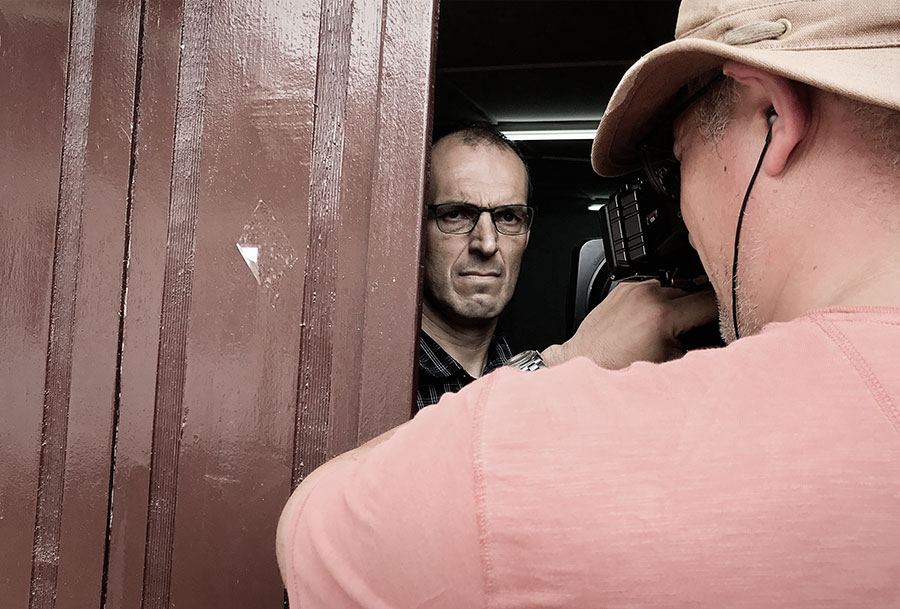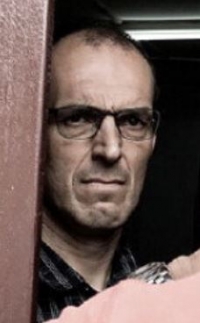“I informed Caritas CAR about the therapist’s letter and asked them to ensure that the issue was followed up with his order,” Roy said. “I was told that the issue had been resolved.”
The admission came out when a CNN report revealed last week that Delft, a priest of the Salesian order, had been convicted in 2012 of child sexual abuse and possession of child pornography. It was revealed earlier this month that Delft is accused of sexually abusing at least two children during his stay in CAR.
This appeared in the December 15th Remnant Newspaper.
Subscribe today and get the e-edition FREE!
Caritas’ admission they knew Delft should not have any contact with children came only after incredible footage was obtained by CNN in CAR in which Delft refused to respond to reporters confronting him with accusations they had heard directly from the children and their families.
An expressionless Delft simply answered “No.” and “Nothing.” to every question, including: “These children are accusing you of abusing them and you have nothing to say for yourself?” The reporter named one child, Alban Alain, from the town of Kaga Bandoro, who said that he and his father both accused Delft of abuse when Alban was 13. Delft responded that he didn’t know the boy.
“For years, the Salesians covered up Delft’s abuse, moving him from post to post, and sending him to work in some of the world’s most troubled places. Despite the allegations he faced, and being convicted of abuse, he was allowed to maintain a high profile -- even receiving the sacrament at a service presided over by Pope Francis at the Vatican this year.
“Delft’s case also raises serious questions about the vetting process at one of the world’s largest Catholic non-governmental organization (NGO) networks, and comes as the church struggles to turn the page on decades of sexual abuse scandals involving members of the clergy.”
Speaking to CNN at his home, Alban Alain, now 17, called the priest “Luk” and said, “He would buy me clothes, he would often give me money. We were always together.” Alban’s father, Onono said, “He was brought here as Director of Caritas and he was entrusted with distributing aid. But instead he took advantage of his position to sodomize my son.” The family came into contact with Caritas Internationalis and Delft when they fled attacks on their home by Islamic militia and took refuge at the NGO’s Catholic compound in Kaga Bandoro.
 Fr. Luk Delft is confronted by CNN reporters over accusations of pedophilia
Fr. Luk Delft is confronted by CNN reporters over accusations of pedophilia
CNN reports that Delft’s history of abusing boys went back to his days in the Salesian order’s boarding school in Ghent. Two men, now grown, spoke to CNN on condition of anonymity. Delft “was meant to watch over the children. Instead he abused them at their most vulnerable, stalking the dormitory at night and assaulting them as they slept.”
In the days since the announcement, every actor of the affair has launched into a round-robin tournament of blame-shifting. In his press statement, Michel Roy said he had forwarded the “concerns” about Delft from the therapist on to Bangui Archbishop, Cardinal Dieudonne Nzapalainga who passed his note on to the leadership of the Salesian order, the same people who had been allowing Delft to continue abusing by moving him from place to place.
A spokesman for the order, Carlo Loos, accused CNN of “tendentious” reporting. He said the Salesians had informed both Belgian civil authorities and the bishop in CAR of Delft’s situation. Loos laid the blame on the Belgian court, saying, “It is the Belgian court that has authorized the person involved to take up a task in CAR, with guarantees from the then bishop in Central African Republic that [Luk Delft] would be under supervision and further fulfill its conditions. [After] the first reports about possible new facts, we ourselves called in the authorities.”
Michael Matt on the Caritas scandal (are you subscribed to The Remnant YouTube channel yet?)
Caritas spokesman Thierry Bonaventura told LifeSiteNews.com that the organisation has “language about safe recruitment” in its “Safeguarding Policy.”
“Caritas Internationalis is adhering to the sector-wide referencing scheme called [the] inter-agency misconduct disclosure scheme,” Bonaventura continued, adding that “a breach of these policies is managed by member organizations and may lead to disciplinary action, including dismissal.” He concluded by passing responsibility off to the national bishops’ conferences in whatever country Caritas operates.
Andre Azzopardi, the head of safeguarding and integrity for Caritas Internationalis, said the Salesians had informed Cardinal Nzapalainga about the Delft’s 2012 conviction, but nothing was done until “the new Caritas Internationalis secretary-general was appointed this year,” Nicole Winfield reports. Azzopardi said that Delft was removed in 2017 when a “new complaints committee reviewed the case.” How CNN got the video of Delft in the Central African Republic remains unaddressed. Azzopardi appeared to blame Cardinal Nzapalaing – one of Pope Francis’ “periphery” cardinals, appointed in 2016, a year after he was made bishop – for inaction, saying, “Not enough was done in 2017.”
The Salesians, founded by St. John Bosco specifically to help children, have a notorious record of sheltering and enabling sex abusers in their midst. In 2011 the order was forced to suspend two priests who were openly supporting pedophilia, one for being a member of a Dutch-based organisation advocating for legalisation of “intergenerational sex”.
One of the priests, Fr. Herman Spronck, had given an interview with public radio in which he said, “We shouldn’t consider age so rigidly.”
“You should never break into the personal space of a child if the child does not want that, but that has to do with the child himself. There are also children who themselves indicate that it is okay. Sexual contact is then also possible.” The Salesian order has faced accusations of enabling sexual abuse by its priests in Belgium, the Netherlands, Australia and the US.
Since 2014, Caritas Internationalis has been headed by Bergoglian favourite Luis Antonio Cardinal Tagle, the 62-year-old archbishop of Manila, Philippines. In a 2015 interview, John Allen called him the “Asian Pope Francis” and reported that he “rejects ostentation in dress and manner, preferring to be called by his nickname ‘Chito’ rather than formal titles.” He was among those at the Synods on the family advocating for abolishing the “harsh” and “severe” language the Church uses to describe homosexual acts, as well as divorce.
So well liked by the pope is Tagle that he was tapped as one of three keynote speakers at the “clerical abuse summit” in February this year, where he famously wept during his own emotive speech in which he condemned bishops who have covered up sex abuse by clergy.
Under the pontificate of Pope Benedict XVI, and well before the latest wave of clerical sexual abuse charges hit the Church, Caritas Internationalis was set for a complete doctrinal revamp. The pope had appointed Cardinal Robert Sarah as the head of Cor Unum, the dicastery overseeing Caritas, with a specific mandate to bring the aid organisation back to a Catholic ethos.
So notorious was Caritas for its devotion to Marxist and secularist doctrines that in 2012 the Vatican announced an initiative with Cor Unum under Sarah to reform the global organisation. The Vatican issued a set of new rules and statutes through the Secretariat of State, then overseen by (Salesian) Cardinal Bertone[1]. The new statutes placed the governance of Caritas directly under the Vatican dicastery. The previous year the Vatican had blocked the reinstatement of Caritas’ then-secretary general, Lesley-Anne Knight, for a second four-year term. Knight had tried to distance Caritas from the Church, saying that the association with Catholicism had hurt fundraising.
Bertone explained that the new statutes were to provide “vigilance in order that both its humanitarian and charitable action and the content of the documents that it disseminates may be in harmony with the Apostolic See and with the Church’s Magisterium.” Under Knight’s leadership Caritas had clashed with the Benedict-led Vatican on several issues related to moral teaching. In her outgoing speech in June 2011, Knight compared herself with Julius Caesar, Abraham Lincoln and Robert F. Kennedy: all assassinated before their terms of office were finished.
During Knight’s term, and continuing since then, Caritas has been in accord with the rest of the NGO world in being – as George Weigel put it in Crisis Magazine – “dominated by an unbending ‘progressive’ orthodoxy on development and health-care questions,” including on the control of the spread of HIV/AIDS, “that sits poorly with Catholic understandings of how people are empowered to break out of the cycle of poverty.”
The new direction for Caritas envisioned by Benedict XVI was revealed in a 2012 speech to African Caritas leaders. Cardinal Sarah warned against leftist materialist utopianism, saying, “The hope of salvation found itself reduced to a temporal messianism and the understanding of Christian life to a form of humanitarian engagement. Many missionaries have practically abandoned evangelization and become invested exclusively in development, human promotion and the fight to ‘eliminate poverty.’”
“The great danger consists in believing that the objective of the charitable mission of the Church is to reform society, to fight for a more just or more democratic society. … Fundamentally, it belongs to the state to deal with social questions; that is not the immediate responsibility of the Church.”
Caritas, he said, “must refuse any ideology contrary to the teaching of God transmitted by the Church and categorically reject all financial aid which imposes ideological conditions opposed to the magisterium…”
So deeply entrenched are these anti-Catholic ideologies in the Church’s charitable agencies around the world that the effort to reclaim Caritas for the Church was probably doomed, whether Benedict had resigned or not. The president of Caritas at the time of the Vatican’s publication of the new statutes was the now-notorious Marxist, Oscar Rodrigues Cardinal Maradiaga (also a Salesian, btw). This is the Honduran prelate who was later to be named by Francis as head the “C-6” group of personally selected papal cardinal-advisors[2]. Maradiaga has since been disgraced, though not dismissed, after revelations of gross financial mismanagement and that he had himself sheltered a homosexual abuser bishop.
Whatever was planned, the project of reforming Caritas was derailed by Francis who in 2016 abolished Cor Unum – rolling its competency into the new “dicastery for integral human development” – and gave the Caritas presidency to his friend and fellow-traveller Cardinal Tagle.
Cardinal Sarah was given an apparent promotion as prefect of the Congregation for Divine Worship and Sacraments – a subject not especially part of the pope’s plans. Sarah had gone public with his call for a “reform of the reform” of the liturgy. Shortly after this, the pope stacked DWS with like-minded “progressives,” effectively isolating and neutralising Sarah. It can be surmised that Sarah’s series of books on Catholic spirituality – the first of which was tellingly titled “The Power of Silence” – is his way of reaching out to the Catholic faithful past the confines of his curial position.
______________
[1] The dominance within the Roman Curia of members of the Salesian order was one of the major points in the dissatisfaction in the Vatican with Bertone and by extension with Pope Benedict – who would hear no criticism of his long-time collaborator. At the time of the resignation of Pope Benedict, Bertone had “stacked” several key offices with Salesians.
[2] Originally this group was known as the “C9” but three have been sent back to their home countries to deal with charges of various misdoings.





